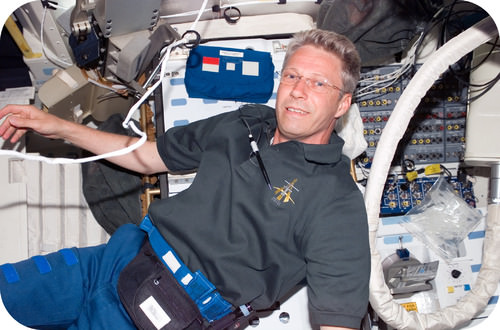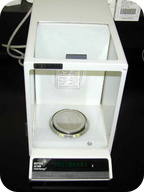3.5 质量和重量
章节大纲
-
How is he floating?
::他怎么漂浮的?One of the many interesting things about travel in outer space is the idea of weightlessness. If something is not fastened down, it will float in mid-air. Early astronauts learned that weightlessness had bad effects on bone structure. If there was no pressure on the legs, those bones would begin to lose mass. Weight provided by gravity is needed to maintain healthy bones. Specially designed equipment is now a part of every space mission so the astronauts can maintain good body fitness.
::有关在外层空间旅行的许多有趣的事情之一是无重力概念。如果某物不固定下来,它会在空中漂浮。早期宇航员知道失重对骨骼结构有坏影响。如果没有对腿的压力,这些骨头将开始失去质量。为了保持健康的骨头,需要重力来提供重力。特别设计的设备现在是每一次太空任务的一部分,这样宇航员才能保持良好的身体健康。Mass and Weight
::重量和重量Mass is a measure of the amount of matter that an object contains. The SI unit of mass is the kilogram or kg, which was originally defined as the mass of 1 L of water at 4°C ( volume of a liquid changes slightly with temperature). The kilogram is the only SI base unit that contains a prefix. This is because when the first physical standard for mass was created in 1799, the methods to measure the mass of something as small as a gram did not exist. In the laboratory, mass is measured with a balance ( Figure ), which must be calibrated with a standard mass so that its measurements are accurate.
::质量是测量物体所含物质数量的一个尺度。 SI质量单位是千克或千克, 最初被定义为4°C时1升的水质量( 液体量随温度略微变化) 。 千克是唯一含有前缀的SI基单位。 这是因为当第一种物质质量标准于1799年创建时, 测量小于1克物质质量的方法并不存在。 在实验室, 质量的测量方法是平衡( 图 ) , 质量必须与标准质量进行校准, 以便测量精确 。An analytical balance makes very sensitive mass measurements in a laboratory, usually in grams.
::分析平衡在实验室进行非常敏感的质量测量,通常以克计。Other common units of mass are the gram and the milligram. A gram is 1/1000th of a kilogram, meaning that there are 1000 g in 1 kg. A milligram is 1/1000th of a gram, so there are 1000 mg in 1 g.
::其他常见质量单位是克和毫克。一克是千克的1/1000,这意味着每公斤有1000克。一毫克是一克的1/1000,因此每克有1000毫克。Mass is often confused with the term weight. Weight is a measure of force that is equal to the gravitational pull on an object. The weight of an object is dependent on its location. On the moon, the force due to gravity is about one sixth that of the gravitational force on Earth. Therefore, a given object will weigh six times more on Earth than it does on the moon. Since mass is dependent only on the amount of matter present in an object, mass does not change with location. Weight measurements are often made with a spring scale by reading the distance that a certain object pulls down and stretches a spring.
::质量通常与用词重量相混淆。 重量是一种与物体的引力拉动量相等的强度尺度。 物体的重量取决于物体的位置。 在月球上, 重力造成的强度约为地球引力的六分之一左右。 因此, 给定的物体在地球上的重量比月球高六倍。 由于质量仅取决于物体中物质的数量, 质量不会随位置变化。 重量测量通常通过读取某一物体拉下并拉开弹簧的距离, 以春季尺度进行。Summary
::摘要-
Mass is a measure of the amount of matter that an object contains.
::质量是测量对象所含物质数量的一个尺度。 -
Weight is a measure of force that is equal to the gravitational pull on an object.
::重量是相当于物体引力拉动力的强度 -
Mass is independent of location, while weight depends on location.
::质量独立于位置,重量取决于位置。
Review
::回顾-
Define mass.
::定义质量 。 -
Define weight.
::界定重量。 -
If I weigh 180 pounds on Earth, what will I weigh on the moon?
::如果我在地球上重180磅 月球上我还能称什么?
-
Mass is a measure of the amount of matter that an object contains.

